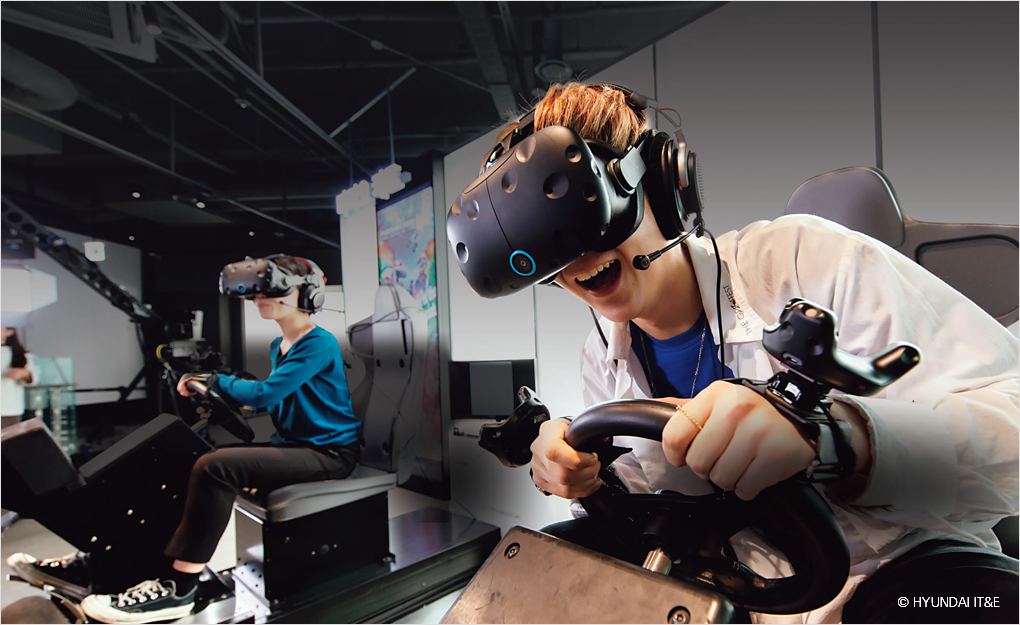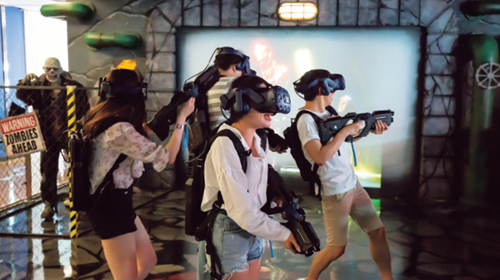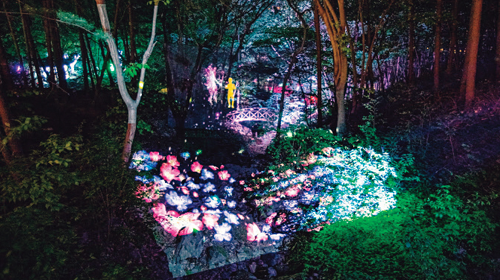Virtual reality theme parks are the new urban playgrounds. Easy accessibility, friendly prices and year-round availability are the main factors attracting a steady stream of families on an outing and young people who love online games.

Customers play “Mario Racing Tournament” at VR Station, a VR outlet near Gangnam Station in Seoul.
“Put on the VR headset in front of you. Please raise your hand if you feel dizzy or have a problem.”
Five “roller coaster” riders put on head-mounted displays (HMDs) with looks of anticipation. Then their chairs jerk forward and begin rocking and pitching repeatedly in a steady ascent. A 30-something woman peers to the left and right with an expression of dazed disbelief.
“Now, we’re going down… Wow!” The guide’s shouting amplifies the sensation of really being outdoors in a steep drop, and the riders react accordingly. Urged by the guide, a child raises his arms in delight. The ride ends about a minute and a half later, and the woman, who had looked left and right, staggers to her feet.
The roller coaster is just one of many rides that overload the senses at “Monster VR,” a virtual reality theme park operated by GPM, a VR platform company, in Songdo, an international business district in Incheon.
Instant Hit
Location, affordability and time have made the theme park an instant hit with families, couples and groups of friends since it opened in 2017. While conventional amusement parks are outdoor venues on the outskirts of cities, theme parks like Monster VR are indoor facilities inside urban areas. That means easier and faster travel from home and year-round availability. Three hours of unlimited VR experiences on weekends and holidays cost 32,000 won, up to 24,000 won less than some conventional amusement parks. The trade-off for the indoor advantages, of course, is forgoing real outdoor rides. But VR technologies are being refined to the point where the line between illusion and reality is blurred.
Monster VR offers experiences in leisure activities, including bobsleigh, rafting and bungee jumping, and harrowing struggles to survive against vampires, zombies and dinosaurs. Besides the roller coaster, there are more than 30 VR rides, including hot air balloons. Moreover, visitors can enjoy both shopping and games at the same time, as most such VR theme parks are located near mega shopping malls. According to a games media outlet, the theme park had over 300,000 visitors during its first year and up to 2,000 visitors per day, 80 percent of them teenagers and those in their 20s and 30s.

“Hunters Game” is one of the most popular games at Monster VR Theme Park in Songdo, Incheon.

A digital media theme park at Vivaldi Park, a resort in Hongcheon, Gangwon Province. Visitors can play a variety of VR games alongside media façades, featuring images projected onto a whole mountain. Holograms and interactive media programs are accessed through the internet of things (IoT).
Surging Interest
The concept of virtual reality is traced to Antonin Artaud, a French playwright who introduced the term in the 1930s. In his collection of essays titled “Le Théâtre et Son Double” (The Theater and Its Double), he insisted that audiences merely see lighting and images, not actors. Decades later, a pair of American computer scientists laid the technological foundation. In 1968, Ivan Sutherland developed the first HMD and in 1989, Jaron Lanier, a visual artist as well, coined the term “virtual reality” as a computer-generated environment.
In the past two years, major expositions in Seoul have been center stage for the VR industry. “VR EXPO 2017” was staged by 53 VR companies from four countries and introduced their latest applications in travel, training, sports, healthcare, architecture and education, as well as video games. Nearly 14,000 enthusiasts visited the three-day B2B event. “VR EXPO 2018” followed up on a much larger scale, with 113 domestic and foreign companies participating. Organizers of “VR EXPO 2019,” scheduled for October 2–4, expected even wider participation by over 200 companies.
There is no doubt that VR is being regarded as much more than a training and education tool for a myriad of professions, including medicine, aviation, engineering and sports.
In Korea, VR theme parks have mushroomed in recent years, just as internet cafés began sprouting up in nearly all neighborhoods about 20 years ago and many Sony PlayStation and Microsoft Xbox stores opened in the early 2000s. VR theme parks help everyone become familiar with technologies that once seemed far removed from their daily lives.
The Korea VR·AR Industry Association estimates the domestic VR market alone could grow fourfold, from 1.4 trillion won in 2016 to 5.7 trillion won in 2020. The explosive growth melds with recent labor law revisions that aim to reduce working hours, in turn giving people more time for entertainment. VR theme parks are considered ideal places for young people, who are accustomed to computers and online games, and for families to spend quality time together.
The development has grabbed the attention of major companies. CJ Hello, a cable broadcaster, collaborated with Daemyung Hotels & Resorts to open “Hello VR Adventure” in June 2018. The venture, mainly targeting families, consists of VR equipment and game rooms installed at Daemyung properties.
Lotte Department Store became the first in the industry to open a VR theme park. In collaboration with GPM, the owner of Monster VR, Lotte converted the 10th floor of its Jayang-dong branch in Seoul’s Gwangjin District in August 2018, offering more than 60 themed games. The branch is in a busy retail area near a university, and business is booming.
Growing Market
In November 2018, an IT company affiliated with Hyundai Department Store opened “VR Station,” the largest VR theme park in the country, in the upscale Gangnam District. This 3,960-square-meter establishment occupies four floors and offers a raft of popular domestic and foreign VR games. It also offers high-end headsets and motion chairs for watching movies, media arts and webtoons. New games developed by Hyundai IT&E will keep the offering fresh.
Illusion World, a VR theme park company, opened “Dongdaemun VR Illusion World,” the largest of its kind in the country, covering 6,600 square meters of the Goodmorning City Shopping Mall near the East Gate, central Seoul. Opened in January this year, it offers a career experience program for young people, in addition to popular VR games.
Lotte World Adventure, a theme park operator for three decades, is also entering the heated VR competition. “In contrast to existing VR theme parks that offer ordinary game contents, we’re going to develop quite different VR rides, as befits an amuse-ment park,” a Lotte World executive said.